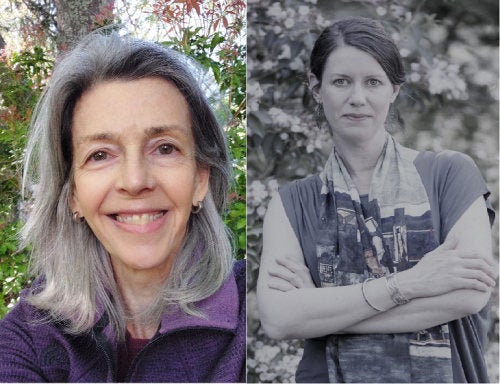Tucked away in the basement of the Coastal Institute on the Kingston campus, CELS alumni Lorraine Joubert and Lisa DeProspo Philo are working to improve local water quality through a program called Rhode Island Nonpoint Education for Municipal Officials (RI NEMO). Nonpoint refers to the pollution that results from runoff as rain or melting snow causing pollutants to end up beyond their original locations. RI NEMO actively works to inform local board and commission members how this can negatively impact water quality. “It started out as an education program for municipal officials,” says Program Director, Joubert.
Joubert has been a part of the team since establishing RI NEMO in 1993. She earned her bachelor’s degree in Natural Resources Science from URI, worked for the Rhode Island Department of Environmental Management (RIDEM) for several years, and then found her way back to URI for a master’s degree. “I was looking for a change and Dr. Art Gold had recently joined the URI Natural Resources Science Department. As a new professor he was offering more courses in watershed hydrology and related topics that were of great interest to me,” mentions Joubert, who enrolled in the Water Resource Management master’s program. After graduation, she started working at URI under a grant from the Narragansett Bay Estuary Program that provided an opportunity to establish a training program for municipal officials on the basics of environmental management. This program focused on considerations when evaluating a development proposal and protecting water quality while still accommodating growth. Training local officials became the foundation of RI NEMO.
In 2004, Joubert was looking for someone to join her on a project involving community wastewater management. In her search, Joubert found Philo, a graduate with a master’s degree from URI’s Environmental and Natural Resource Economics who was working in the Natural Resources Department on land use planning and water resources research. Philo had communication skills matching the needs of the program. “Even though I had really no experience with wastewater,” says Philo, “[Lorraine] hired me and that began my tenure here in the NEMO Program.” Philo now works as RI NEMO’s Communications Specialist.
When considering past projects, Philo mentions her favorite was called Rhode Island Stormwater Solutions which included the development of a website for both the general public and municipal stormwater managers to access information. Joubert highlighted the project’s statewide impact due to the wide information base that was developed. The project eventually was transferred to the RIDEM website where it currently resides. “It’s still an interesting and somewhat useful warehouse of practical methods to reduce polluted runoff and protect local water quality,” Philo elaborates.
Currently, RI NEMO is working to improve stormwater and watershed management with the Southeast New England Program (SNEP) Network. “The goal is to help municipalities better manage stormwater throughout the Narragansett Bay watershed, both in Massachusetts and Rhode Island,” explains Joubert. The team is in the third year of this five-year project and is using the Low-Impact Development (LID) Municipal Self-Assessment Guide developed with RIDEM under the Department of Transportation Stormwater Solutions project. “Right now, we’re focusing on helping municipalities review their local ordinances compared to national benchmark standards and incorporate better stormwater management practices when there’s new development,” Joubert adds.
With municipal training programs as a focal point for RI NEMO, the team is delighted to see an increase in state requirements for continuing education of board members. These requirements include training board members on the basics of stormwater and watershed management, thus allowing them to make more informed decisions. “There’s always a need for educational resources because there’s high turnover among volunteer board and commission members at the municipal level,” mentions Joubert. “The good thing is that there are now other programs that provide training for municipal officials on critical water resource management topics affecting RI communities, including adaptation to climate change and coastal flooding,” she adds.
She also adds that since many town boards, such as local conservation commissions, are volunteer-based, they are an excellent way for students to get involved locally and use their classroom training to make a difference. Starting with conservation commissions, which are advisory and often project-oriented, is the easiest way for students to begin. Afterwards, they might look into joining planning boards for direct involvement with land use planning decisions and review of development applications.
Philo and Joubert also promote involvement through RI NEMO student internships. “I think one of the cool things about NEMO has been that we’re a really good little incubator for internships, and it’s definitely mutually beneficial,” says Philo. Students and recent graduates have been added to the RI NEMO team as interns and can work directly on municipal projects, building their own skills through field experience; there is also the opportunity to receive course credit for these internships.
RI NEMO continues to thrive with Joubert and Philo leading the way. Their commitment and motivation throughout their careers are evident in the RI NEMO projects, and they are excited to continue working together to develop the program.

